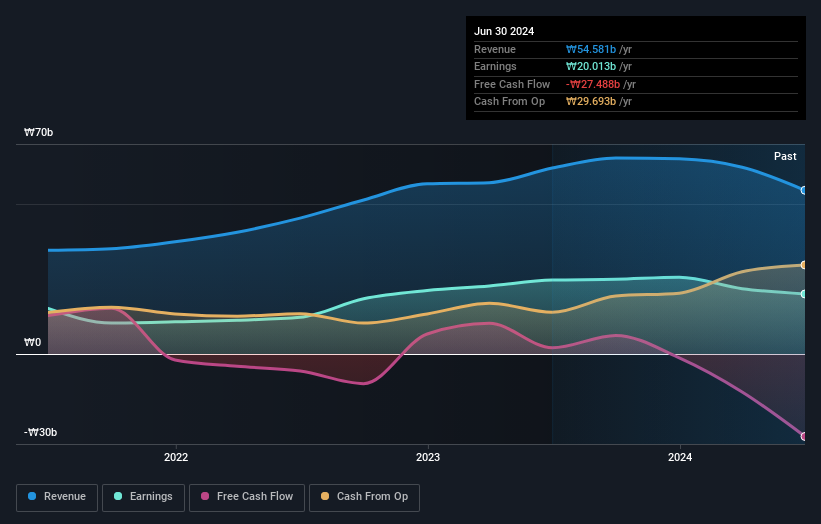- South Korea
- /
- Medical Equipment
- /
- KOSDAQ:A099430
Bio Plus Co., Ltd (KOSDAQ:099430) surges 14%; retail investors who own 60% shares profited along with insiders

Key Insights
- Bio Plus' significant retail investors ownership suggests that the key decisions are influenced by shareholders from the larger public
- A total of 10 investors have a majority stake in the company with 40% ownership
- Insider ownership in Bio Plus is 34%
To get a sense of who is truly in control of Bio Plus Co., Ltd (KOSDAQ:099430), it is important to understand the ownership structure of the business. The group holding the most number of shares in the company, around 60% to be precise, is retail investors. That is, the group stands to benefit the most if the stock rises (or lose the most if there is a downturn).
While retail investors were the group that reaped the most benefits after last week’s 14% price gain, insiders also received a 34% cut.
Let's take a closer look to see what the different types of shareholders can tell us about Bio Plus.
View our latest analysis for Bio Plus

What Does The Institutional Ownership Tell Us About Bio Plus?
Institutional investors commonly compare their own returns to the returns of a commonly followed index. So they generally do consider buying larger companies that are included in the relevant benchmark index.
As you can see, institutional investors have a fair amount of stake in Bio Plus. This suggests some credibility amongst professional investors. But we can't rely on that fact alone since institutions make bad investments sometimes, just like everyone does. If multiple institutions change their view on a stock at the same time, you could see the share price drop fast. It's therefore worth looking at Bio Plus' earnings history below. Of course, the future is what really matters.

We note that hedge funds don't have a meaningful investment in Bio Plus. Looking at our data, we can see that the largest shareholder is the CEO Hyun-Kyu Jung with 31% of shares outstanding. For context, the second largest shareholder holds about 5.3% of the shares outstanding, followed by an ownership of 2.8% by the third-largest shareholder.
A deeper look at our ownership data shows that the top 10 shareholders collectively hold less than half of the register, suggesting a large group of small holders where no single shareholder has a majority.
While it makes sense to study institutional ownership data for a company, it also makes sense to study analyst sentiments to know which way the wind is blowing. As far as we can tell there isn't analyst coverage of the company, so it is probably flying under the radar.
Insider Ownership Of Bio Plus
While the precise definition of an insider can be subjective, almost everyone considers board members to be insiders. The company management answer to the board and the latter should represent the interests of shareholders. Notably, sometimes top-level managers are on the board themselves.
Most consider insider ownership a positive because it can indicate the board is well aligned with other shareholders. However, on some occasions too much power is concentrated within this group.
Our most recent data indicates that insiders own a reasonable proportion of Bio Plus Co., Ltd. It has a market capitalization of just ₩331b, and insiders have ₩111b worth of shares in their own names. It is great to see insiders so invested in the business. It might be worth checking if those insiders have been buying recently.
General Public Ownership
The general public, mostly comprising of individual investors, collectively holds 60% of Bio Plus shares. With this amount of ownership, retail investors can collectively play a role in decisions that affect shareholder returns, such as dividend policies and the appointment of directors. They can also exercise the power to vote on acquisitions or mergers that may not improve profitability.
Next Steps:
I find it very interesting to look at who exactly owns a company. But to truly gain insight, we need to consider other information, too. Case in point: We've spotted 2 warning signs for Bio Plus you should be aware of, and 1 of them shouldn't be ignored.
If you would prefer check out another company -- one with potentially superior financials -- then do not miss this free list of interesting companies, backed by strong financial data.
NB: Figures in this article are calculated using data from the last twelve months, which refer to the 12-month period ending on the last date of the month the financial statement is dated. This may not be consistent with full year annual report figures.
Valuation is complex, but we're here to simplify it.
Discover if Bio Plus might be undervalued or overvalued with our detailed analysis, featuring fair value estimates, potential risks, dividends, insider trades, and its financial condition.
Access Free AnalysisHave feedback on this article? Concerned about the content? Get in touch with us directly. Alternatively, email editorial-team (at) simplywallst.com.
This article by Simply Wall St is general in nature. We provide commentary based on historical data and analyst forecasts only using an unbiased methodology and our articles are not intended to be financial advice. It does not constitute a recommendation to buy or sell any stock, and does not take account of your objectives, or your financial situation. We aim to bring you long-term focused analysis driven by fundamental data. Note that our analysis may not factor in the latest price-sensitive company announcements or qualitative material. Simply Wall St has no position in any stocks mentioned.
About KOSDAQ:A099430
Bio Plus
Engages in the research and development, production, and sale of bio products in South Korea.
Excellent balance sheet unattractive dividend payer.

